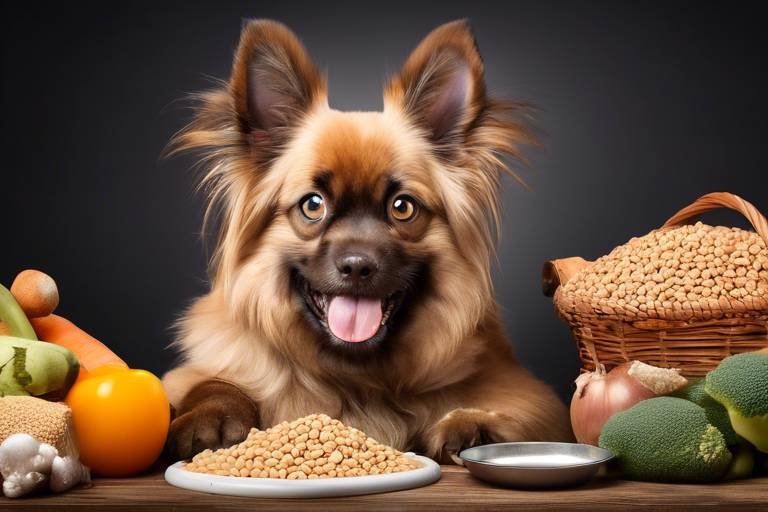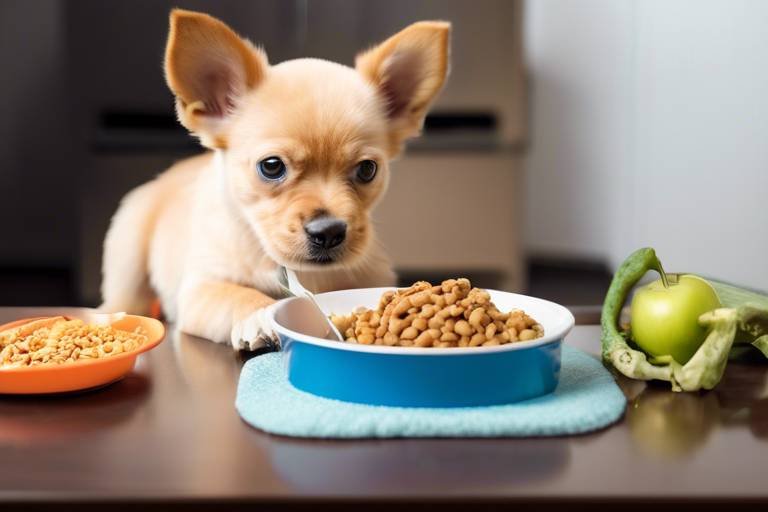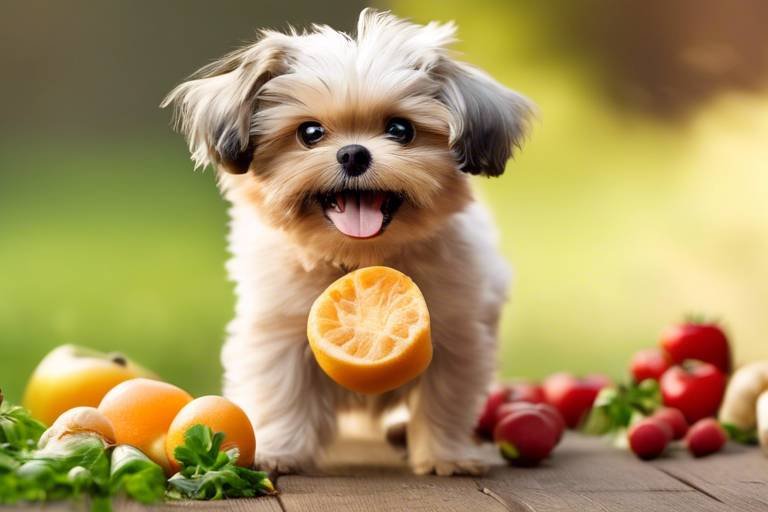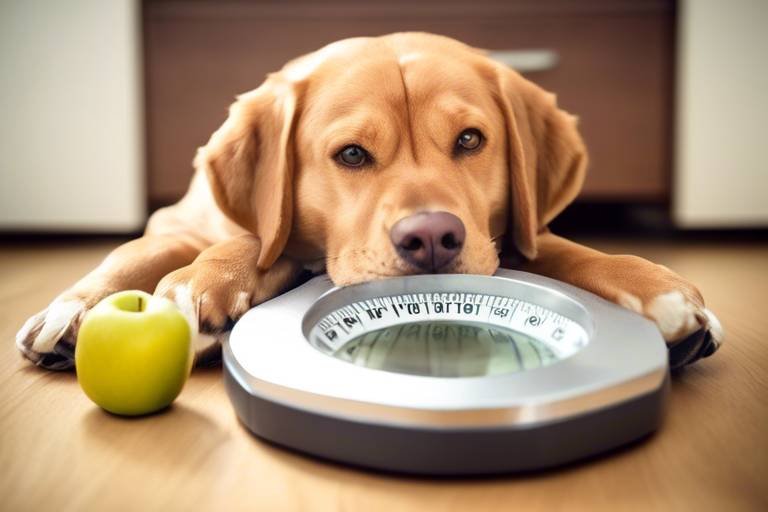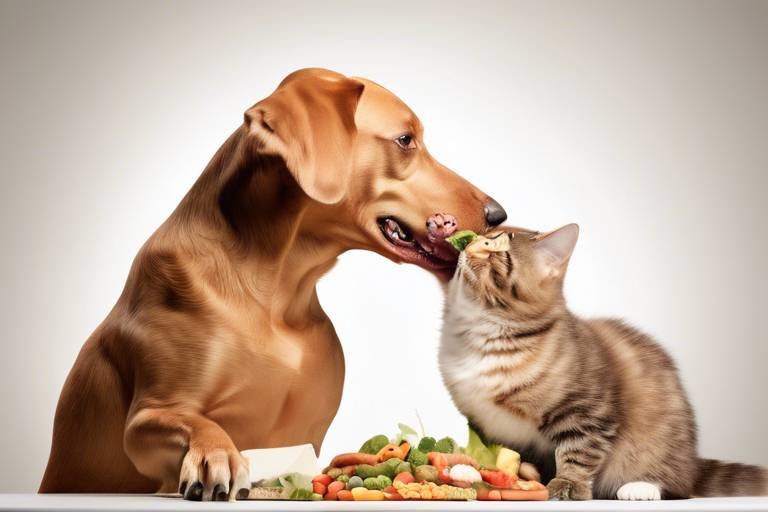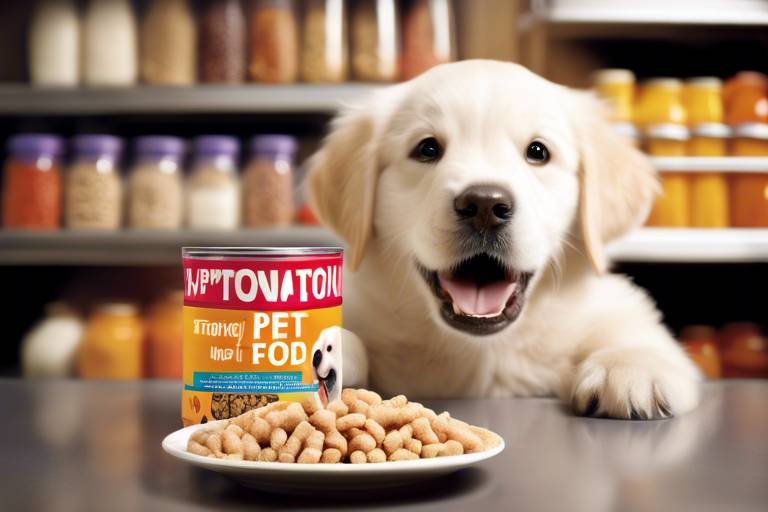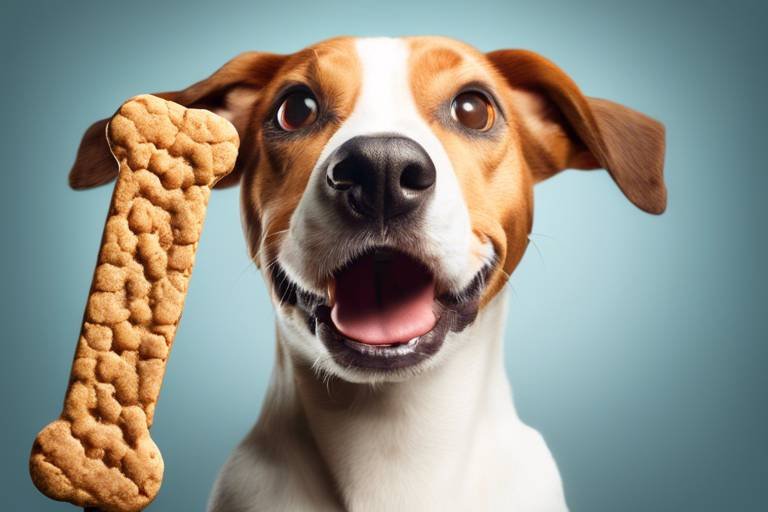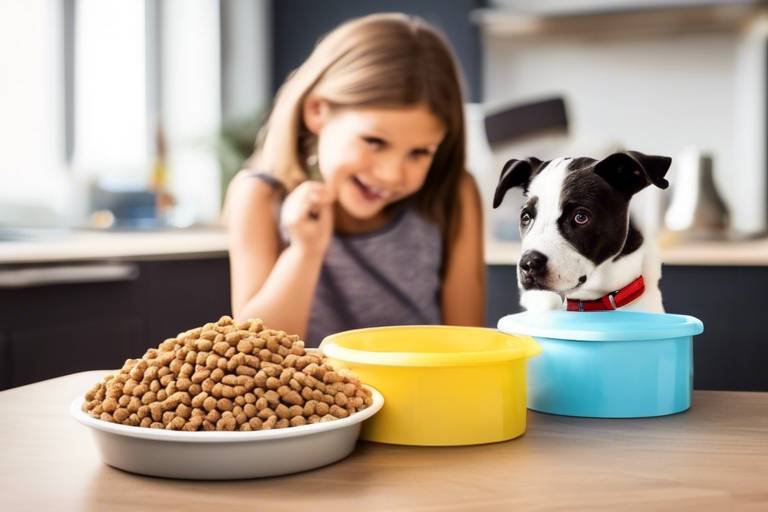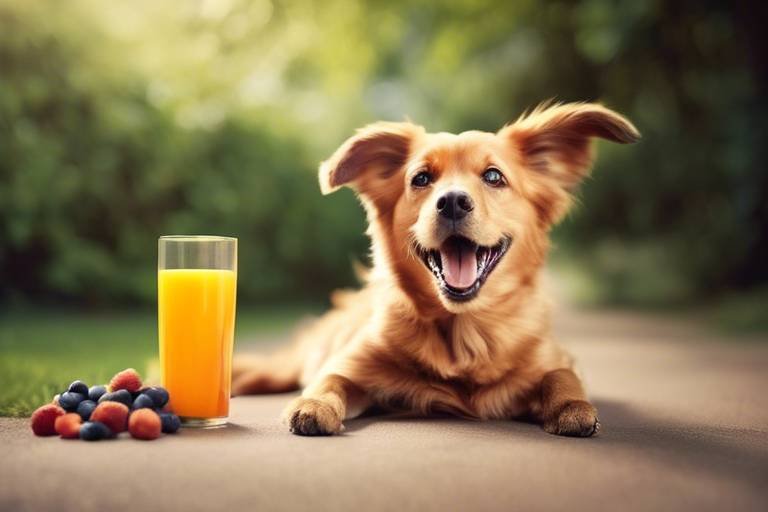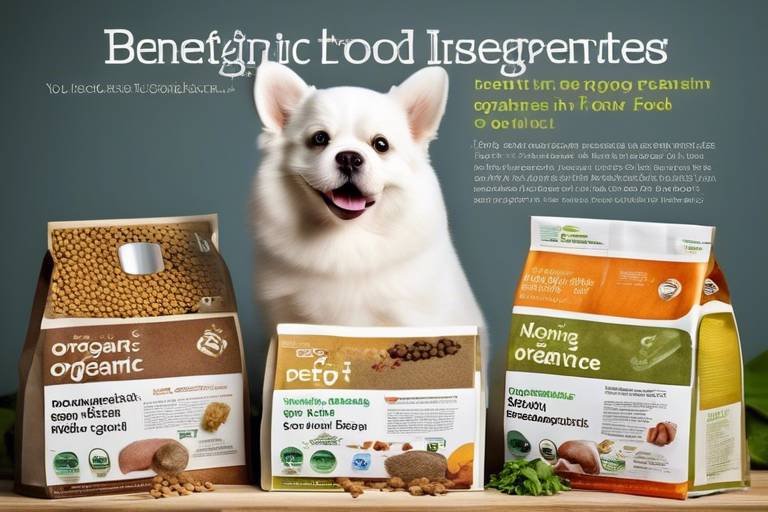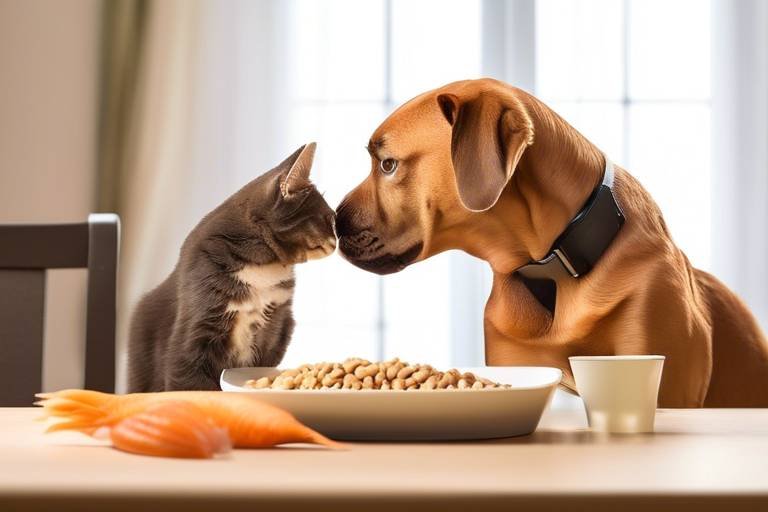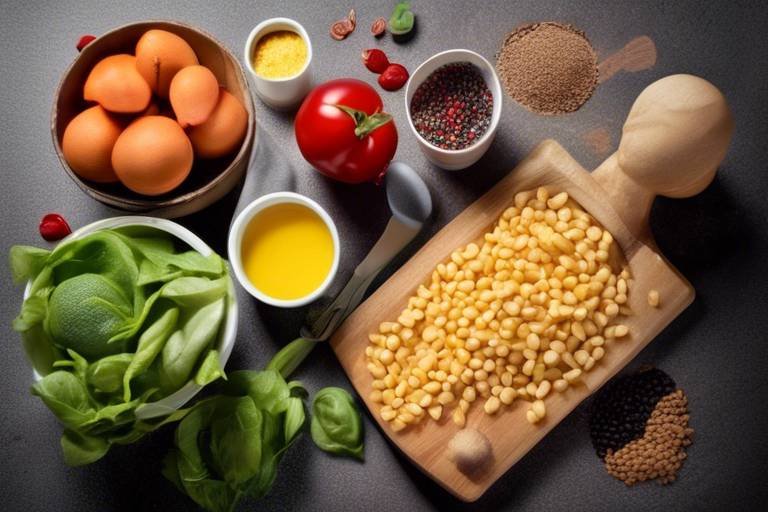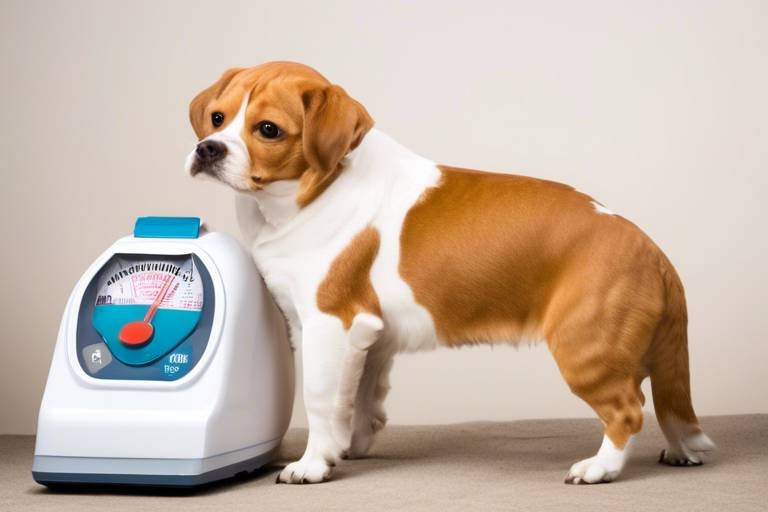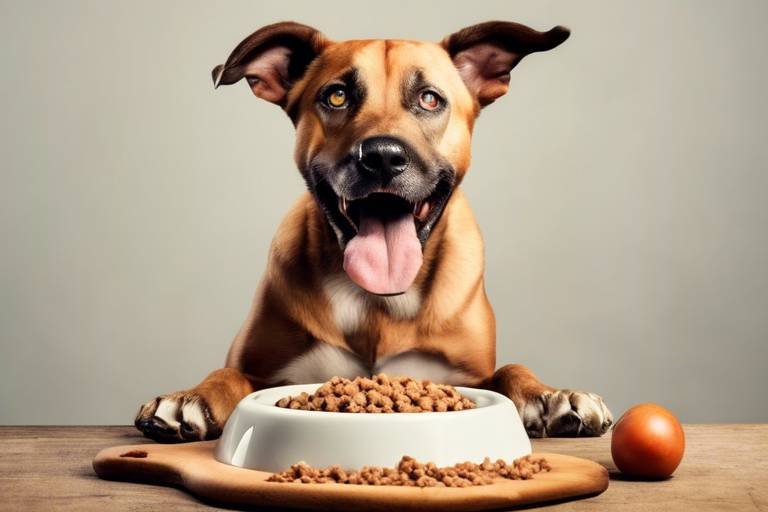Understanding Your Pet's Nutritional Needs
When it comes to our beloved furry friends, their nutritional needs are as diverse as their personalities. Just like humans, pets require a balanced diet to thrive. This article dives deep into the essential aspects of your pet's diet, exploring the right nutrients, effective feeding practices, and how to tailor nutrition according to specific breeds and life stages. Understanding these factors is crucial not just for their immediate health but also for their long-term well-being. After all, a well-fed pet is a happy pet!
Imagine your pet as a finely tuned machine. Each component needs the right fuel to operate efficiently. Without proper nutrition, you might notice your pet becoming lethargic, irritable, or even developing health issues. This is why it’s vital to grasp the importance of a balanced diet. A well-rounded diet supports growth, energy levels, and overall vitality, ensuring your pet can enjoy life to the fullest. Think of it as giving them the tools they need to build a strong, healthy body!
Now, let’s break down what makes up a balanced diet for pets. It’s not just about filling their bowl with food; it’s about ensuring that food is packed with the right nutrients. Pets require a variety of nutrients including:
- Proteins: Essential for growth and repair.
- Fats: The primary energy source and vital for skin health.
- Carbohydrates: A source of energy that can be beneficial when chosen wisely.
- Vitamins and Minerals: Crucial for various bodily functions.
Each nutrient plays a unique role in maintaining health and supporting bodily functions. For instance, proteins are crucial for muscle development and immune function, while fats are necessary for absorbing fat-soluble vitamins and maintaining healthy skin and coat. It’s important to note that not all pets are the same; their dietary needs can vary significantly based on factors such as age, breed, and activity level.
As we journey through this article, we’ll uncover how to make informed choices about your pet’s diet. From understanding the significance of protein sources to the role of carbohydrates, we’ll provide you with the knowledge needed to keep your pet healthy and happy. So, let’s embark on this adventure of understanding your pet’s nutritional needs together!
Here are some common questions pet owners have regarding their pets' nutritional needs:
- What should I feed my puppy? Puppies require a diet rich in proteins and fats to support their rapid growth and energy levels.
- Can I feed my pet table scraps? While some human foods are safe, many can be harmful. It's best to stick to pet-specific foods.
- How often should I feed my pet? The feeding schedule can vary by age and size; consult your vet for personalized advice.
- Are dietary supplements necessary? Supplements can be beneficial but should be discussed with your veterinarian to ensure they are needed.

The Importance of Proper Nutrition
When it comes to our furry friends, proper nutrition is not just a matter of filling their bowls with food. It's about fostering their overall health and well-being. Just like us, pets require a balanced diet to thrive and live their best lives. A well-rounded diet can help prevent a plethora of health issues, from obesity to diabetes, and even heart disease. Imagine your pet as a finely tuned machine; without the right fuel, it simply won't operate at its best. Proper nutrition supports growth, energy levels, and overall vitality, ensuring your pet has the energy to play, explore, and enjoy life.
But what exactly does "proper nutrition" entail? It involves a careful balance of essential nutrients tailored to your pet's specific needs. For instance, young puppies and kittens need a diet rich in proteins and fats to support their rapid growth and development, while older pets may require a diet lower in calories but higher in fiber to maintain a healthy weight. It's all about understanding the unique requirements of your pet based on their age, size, and activity level.
Moreover, a balanced diet can significantly enhance your pet's quality of life. Pets that receive proper nutrition tend to have brighter eyes, a shiny coat, and more energy. They are less prone to diseases and can recover faster from illnesses. In essence, investing in your pet's nutrition is akin to investing in their happiness and longevity. So, how can you ensure that your pet is getting the best possible nutrition?
First and foremost, it's crucial to consult with your veterinarian. They can offer personalized dietary recommendations based on your pet's health status and lifestyle. Additionally, reading labels and understanding the ingredients in your pet's food can help you make informed choices. Look for high-quality ingredients and avoid foods with excessive fillers or artificial additives. Remember, you wouldn't want to eat junk food all the time, and neither does your pet!
To sum it up, proper nutrition is the foundation of a healthy, happy pet. It goes beyond just feeding them; it's about nurturing them with the right balance of nutrients to support their unique needs. By prioritizing their diet, you are not only enhancing their quality of life but also paving the way for a longer, healthier future together. So, as you scoop that kibble into their bowl, remember that you're fueling not just their body, but their spirit!
- What are the signs of a well-nourished pet? A well-nourished pet typically has a shiny coat, bright eyes, and a healthy weight. They are active and playful, and their skin is free from irritations.
- Can I feed my pet human food? While some human foods are safe for pets, many can be harmful. Always consult your vet before introducing new foods.
- How often should I feed my pet? Feeding schedules can vary based on age and size. Puppies and kittens may require more frequent meals, while adult pets typically do well with two meals a day.
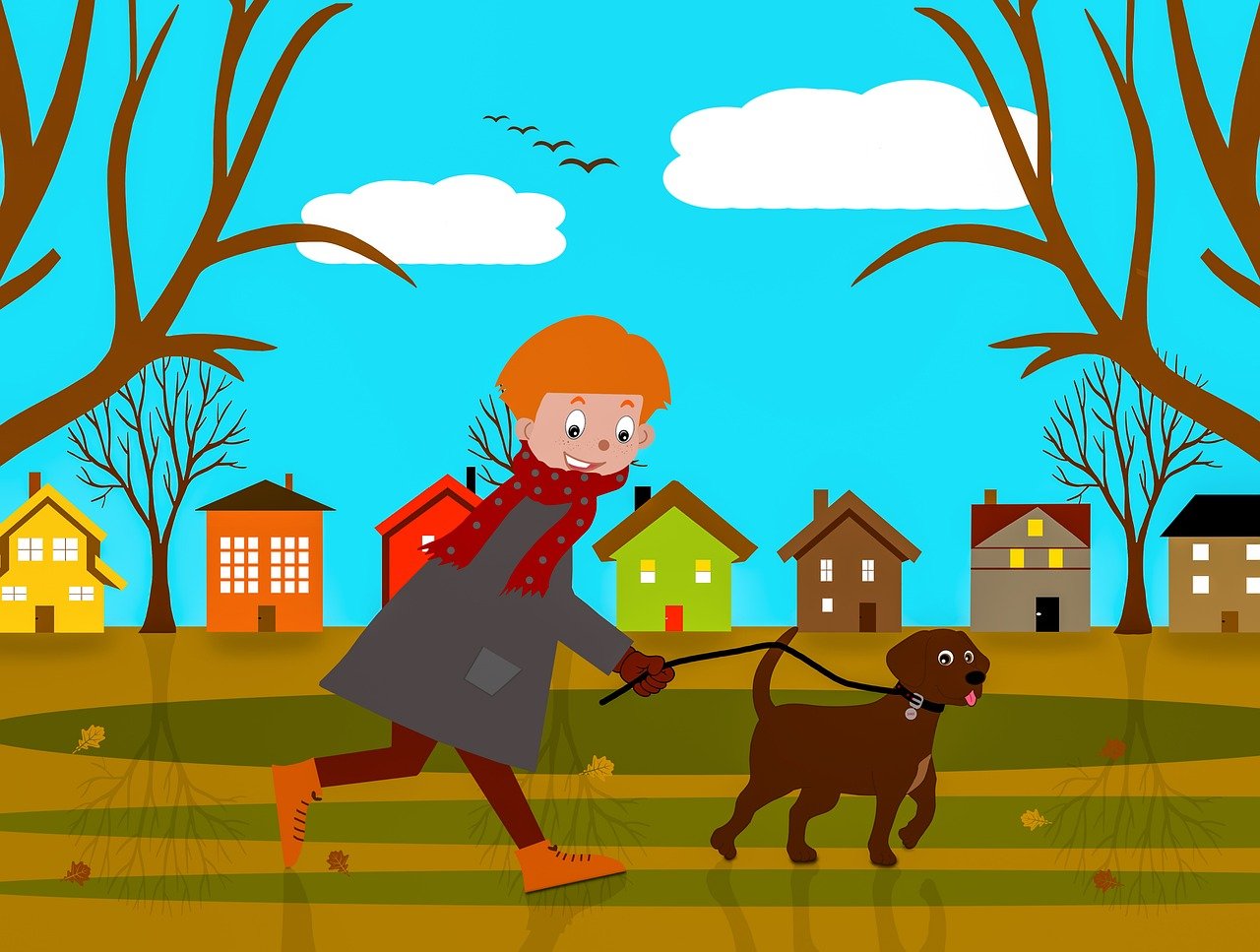
Key Nutrients for Pets
When it comes to keeping your furry friend healthy and happy, understanding the key nutrients that make up their diet is absolutely essential. Just like humans, pets require a balanced mix of nutrients to thrive. This includes proteins, fats, carbohydrates, vitamins, and minerals. Each of these components plays a unique role in maintaining your pet's overall health, energy levels, and well-being. You might be wondering, "How do I know if my pet is getting the right nutrients?" Well, let’s break it down.
First up, proteins are the building blocks of life. They are crucial for growth, repair, and the overall health of your pet. Proteins provide essential amino acids that are necessary for muscle development and a robust immune system. Think of proteins as the bricks that build a strong house—without them, your pet's health could crumble. Common sources of protein include meat, fish, and legumes, each offering different benefits that can enhance your pet's diet.
Next, we have fats. Now, you might think fats are bad, but in the world of pet nutrition, they are actually essential. Fats serve as a concentrated source of energy and are vital for absorbing fat-soluble vitamins such as A, D, E, and K. They also contribute to a shiny coat and healthy skin. Imagine fats as the fuel that keeps your pet's engine running smoothly. However, moderation is key, as too much fat can lead to obesity.
Then there are carbohydrates. This is where things get a bit controversial. While some pet owners debate the necessity of carbs in a pet’s diet, they can provide a valuable source of energy. The key is to choose the right types of carbohydrates. Whole grains, like brown rice and oats, are generally better options than refined grains. They offer fiber that aids digestion and helps maintain a healthy weight. Think of carbohydrates as the slow-burning fuel that keeps your pet energized throughout the day.
To give you a clearer picture of the essential nutrients and their sources, take a look at the table below:
| Nutrient | Function | Sources |
|---|---|---|
| Proteins | Growth, repair, immune function | Meat, fish, legumes |
| Fats | Energy, vitamin absorption, skin health | Fish oil, chicken fat, flaxseed |
| Carbohydrates | Energy, digestive health | Brown rice, sweet potatoes, oats |
| Vitamins | Support metabolic processes | Fruits, vegetables, supplements |
| Minerals | Bone health, nerve function | Meat, dairy, leafy greens |
Lastly, don't forget about vitamins and minerals. These micronutrients are crucial for various metabolic processes and overall health. They help with everything from bone strength to nerve function. Incorporating a variety of fruits and vegetables into your pet's diet can help ensure they get these essential nutrients. Think of vitamins and minerals as the tiny gears in a clock that keep everything ticking perfectly.
In summary, ensuring your pet receives a balanced diet rich in proteins, fats, carbohydrates, vitamins, and minerals is vital for their health and longevity. By understanding the role of each nutrient, you can make informed choices about your pet's diet, keeping them vibrant and full of life. So, the next time you fill your pet's bowl, remember that you’re not just feeding them; you’re fueling their happiness and well-being!
- What are the signs that my pet is not getting enough nutrients? Look for signs such as lethargy, poor coat condition, and weight loss.
- Can I feed my pet a vegetarian diet? Yes, but it requires careful planning to ensure all essential nutrients are included.
- How often should I consult with my veterinarian about my pet's diet? Regular check-ups, at least once a year, are recommended to adjust dietary needs based on your pet's health status.
Proteins and Their Role
When it comes to your pet's health, proteins are the unsung heroes that play a pivotal role in their overall well-being. Just like humans need protein to build and repair muscles, your furry friends rely on this essential nutrient for a variety of bodily functions. Proteins are made up of amino acids, which are the building blocks for tissues, enzymes, and hormones. Without adequate protein, your pet may face issues such as stunted growth, weakened immune response, and poor coat condition.
Imagine proteins as the construction workers of your pet's body, tirelessly repairing and building tissues. They are critical for muscle development, which is especially important for active pets. A lack of protein can lead to muscle wasting and lethargy, making your pet feel less energetic and more prone to illness. This is why ensuring your pet gets enough protein in their diet is not just important; it's essential for a vibrant life.
But where do we find these proteins? Well, there are several sources, and understanding them can help you make the best choices for your pet. Here are some common sources of protein:
- Meat: Chicken, beef, and lamb are excellent sources of high-quality protein.
- Fish: Salmon and tuna not only provide protein but also beneficial omega-3 fatty acids.
- Legumes: Peas and lentils are great plant-based protein sources, especially for vegetarian diets.
It's also important to recognize the signs of protein deficiency. If you notice that your pet has a dull coat, is losing weight, or appears lethargic, it may be time to reevaluate their protein intake. Early intervention can make a significant difference in your pet's health. Consulting with a veterinarian can help you determine the right protein sources and amounts tailored to your pet's specific needs.
In conclusion, proteins are a vital part of your pet's diet that should never be overlooked. They support growth, repair tissues, and keep your pet feeling their best. Just like you wouldn't build a house without a solid foundation, you shouldn't skimp on protein when it comes to your pet's nutrition. Make sure to incorporate a variety of protein sources into their diet to ensure they receive all the essential amino acids they need to thrive.
Q1: How much protein does my pet need?
A1: The amount of protein required varies by species, age, and activity level. Generally, adult dogs need about 18-25% protein, while puppies and active breeds may require more. Cats typically need around 26% protein in their diet.
Q2: Can pets get enough protein from plant-based sources?
A2: Yes, pets can get protein from plant-based sources, but it's important to ensure they receive all essential amino acids. Combining different plant proteins can help achieve this.
Q3: What are the signs of protein deficiency in pets?
A3: Common signs include poor coat condition, lethargy, weight loss, and a weakened immune system. If you notice these symptoms, consult your veterinarian.
Sources of Protein
When it comes to your pet's diet, understanding the is essential for their overall health and vitality. Protein is not just a single entity; it comes from various sources, each offering unique benefits that contribute to your pet's well-being. The most common sources of protein for pets include meat, fish, eggs, and legumes. Each of these sources provides a different profile of amino acids, which are the building blocks of protein.
Meat, especially muscle meat from animals like chicken, beef, and lamb, is often considered the gold standard for protein. It is not only rich in essential amino acids but also contains vital nutrients such as iron and zinc. Fish, on the other hand, is an excellent source of protein and also provides omega-3 fatty acids, which are beneficial for skin and coat health. Additionally, fish is easier to digest for some pets, making it a great alternative.
Eggs are another fantastic protein source that is highly bioavailable, meaning pets can absorb and utilize the protein efficiently. They also contain a variety of vitamins and minerals that support overall health. For those looking to incorporate plant-based proteins, legumes such as lentils and chickpeas can be excellent choices. While they may not provide all essential amino acids on their own, when combined with grains, they can form a complete protein profile.
Here’s a quick comparison of different protein sources:
| Protein Source | Amino Acid Profile | Additional Nutrients |
|---|---|---|
| Meat | Complete | Iron, Zinc |
| Fish | Complete | Omega-3 Fatty Acids |
| Eggs | Complete | Vitamins A, B12 |
| Legumes | Incomplete | Fiber, Iron |
It's crucial to note that while protein is essential, the quality of the protein source matters significantly. Always opt for high-quality ingredients when selecting pet food or preparing homemade meals. Additionally, be mindful of any allergies or sensitivities your pet may have, as some proteins, like chicken or beef, can cause adverse reactions in certain pets.
In summary, providing a variety of protein sources can help ensure your pet receives a balanced diet rich in essential amino acids and other nutrients. This not only supports their physical health but can also enhance their energy levels and overall quality of life.
Signs of Protein Deficiency
Recognizing the signs of protein deficiency in your pet is crucial for ensuring their health and well-being. Just like humans, pets rely on proteins to maintain their bodily functions, and a lack of this essential nutrient can lead to a variety of health issues. One of the first signs that your furry friend may be lacking in protein is a noticeable decline in their coat condition. You might observe that their fur appears dull, brittle, or even starts to fall out. This can be a clear indicator that their body isn't receiving the necessary building blocks to support a healthy coat.
Another common sign of protein deficiency is lethargy. If your pet seems unusually tired or less active than usual, it could be a sign that they are not getting enough energy from their diet. A lack of protein can hinder muscle development and overall vitality, making your pet less enthusiastic about playtime or walks. Additionally, you might notice changes in their appetite; some pets may start to eat less, while others might seem to have an insatiable hunger as their bodies crave the nutrients they are missing.
Moreover, protein deficiency can lead to more serious health issues, such as weakened immune function. Pets that are lacking in protein may become more susceptible to infections and illnesses, as their bodies struggle to produce the necessary antibodies to fight off diseases. You might also observe a slower recovery from injuries or illnesses, which can be alarming for any pet owner.
In some cases, pets may exhibit behavioral changes as well. Increased irritability or mood swings can occur when their nutritional needs aren't being met. It's essential to monitor your pet closely and look for any of these signs, especially if you suspect that their diet may not be providing adequate protein. If you notice any of these symptoms, it's important to consult with your veterinarian to assess your pet's dietary needs and make appropriate adjustments.
| Signs of Protein Deficiency | Description |
|---|---|
| Poor Coat Condition | Dull, brittle fur or excessive shedding |
| Lethargy | Unusual tiredness or decreased activity levels |
| Changes in Appetite | Eating less or increased hunger |
| Weakened Immune Function | Increased susceptibility to infections |
| Behavioral Changes | Increased irritability or mood swings |
In summary, being vigilant about your pet’s dietary intake is essential for their overall health. If you notice any of these signs, don't hesitate to reach out to a veterinarian. They can provide guidance on how to enhance your pet's nutrition and ensure they get the protein they need for a happy, healthy life.
Q: How can I ensure my pet is getting enough protein?
A: It's important to choose high-quality pet food that lists a good source of protein as the first ingredient. You can also consult with your veterinarian for personalized recommendations based on your pet's specific needs.
Q: Can I add protein supplements to my pet's diet?
A: While protein supplements can be beneficial, it's best to discuss this with your veterinarian first. They can help determine if your pet needs additional protein and recommend appropriate products.
Q: What are some good protein sources for pets?
A: Good sources of protein for pets include meat (like chicken, beef, or fish), eggs, and certain legumes. Always ensure that the protein source is appropriate for your pet's specific dietary needs.
Fats: The Energy Source
When it comes to your pet's diet, fats are often misunderstood. Many pet owners worry about fats, thinking they might lead to obesity or other health issues. However, it's essential to understand that fats are a crucial part of your pet's nutrition. They are not just an energy source; they also play several vital roles in maintaining your pet's overall health. Think of fats as the fuel that keeps your pet's engine running smoothly. Without enough of this energy source, your furry friend may feel sluggish, and their coat might lose its shine.
Fats serve as a concentrated source of energy, providing more than double the energy per gram compared to proteins and carbohydrates. This makes them particularly important for active pets or those that require a high-energy diet. Moreover, fats are essential for the absorption of fat-soluble vitamins such as A, D, E, and K. These vitamins play crucial roles in immune function, bone health, and maintaining healthy skin and coat. Just like how we need a balanced diet to thrive, our pets require a mix of nutrients, including healthy fats, to stay healthy.
There are various sources of fats that can be beneficial for your pet. Some of the most common include:
- Animal Fats: Found in meats and fish, these are excellent for energy and flavor.
- Plant Oils: Such as flaxseed oil and fish oil, these provide essential fatty acids that promote a healthy coat.
- Nuts and Seeds: Though they should be given in moderation, some nuts and seeds can be beneficial.
However, not all fats are created equal. It's crucial to differentiate between healthy fats and unhealthy fats. Healthy fats, such as omega-3 and omega-6 fatty acids, are essential for your pet's health, promoting good skin, a shiny coat, and even joint health. On the other hand, trans fats and excessive saturated fats can lead to health issues like obesity and heart disease. Therefore, when selecting pet food, always check the labels for the types of fats included.
In conclusion, incorporating the right types of fats into your pet's diet can significantly enhance their overall health and energy levels. Always consult with your veterinarian to determine the best fat sources and amounts for your pet's specific needs, ensuring they enjoy a balanced and healthy diet.
Q: How much fat should be in my pet's diet?
A: The amount of fat your pet needs can vary based on their age, size, and activity level. Generally, a balanced diet should contain around 8-15% fat for adult pets, but consult your vet for personalized recommendations.
Q: Are all fats bad for pets?
A: No, not all fats are bad. Healthy fats, like omega-3 and omega-6 fatty acids, are essential for your pet's health. It's important to avoid trans fats and limit saturated fats.
Q: Can I add oils to my pet's food?
A: Yes, adding healthy oils like fish oil or flaxseed oil can benefit your pet's coat and skin. However, moderation is key, so consult your vet for the right amount.
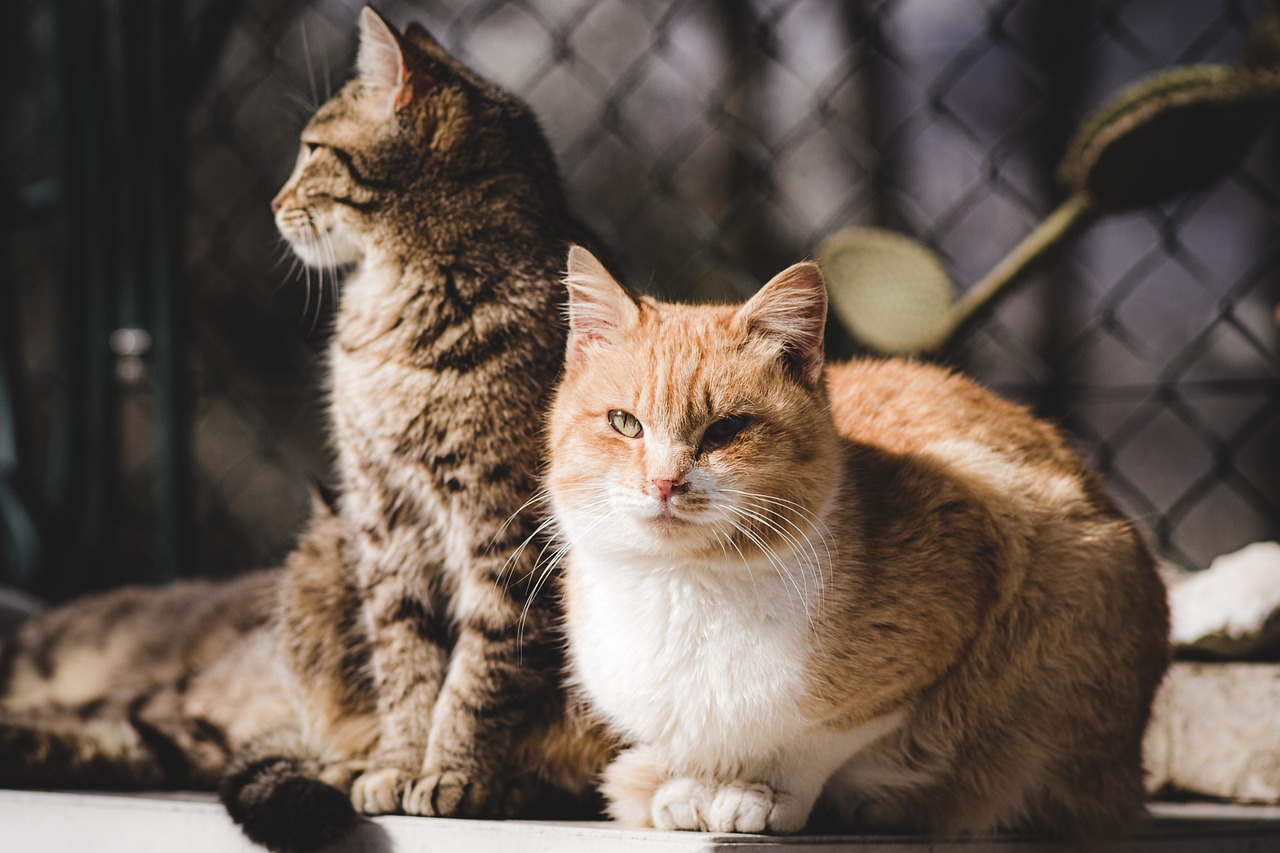
Carbohydrates: Friend or Foe?
When it comes to your pet's diet, carbohydrates often spark a heated debate among pet owners and nutritionists alike. Are they a valuable source of energy or just empty fillers? The truth lies somewhere in between. While it's essential to provide your furry friend with the right nutrients, understanding the role of carbohydrates can help you make informed decisions about their diet.
Carbohydrates are primarily known for being a quick source of energy. They break down into glucose, which fuels your pet's daily activities. However, not all carbohydrates are created equal. The distinction between whole grains and refined grains is crucial. Whole grains, such as brown rice and oats, are packed with fiber, vitamins, and minerals, making them a beneficial addition to your pet's meals. On the other hand, refined grains, like white rice and many commercial pet foods, often lack these essential nutrients and can lead to health issues if consumed in excess.
To further understand the impact of carbohydrates on your pet's health, let's take a look at some common carbohydrate sources:
| Carbohydrate Source | Benefits |
|---|---|
| Sweet Potatoes | High in fiber, vitamins A and C, and antioxidants. |
| Brown Rice | Provides energy and is easier to digest than white rice. |
| Oats | Rich in fiber and helps with digestion. |
| Barley | Contains vitamins and minerals, supports digestion. |
While carbohydrates can be beneficial, moderation is key. Too many carbs can lead to weight gain and other health issues. It's essential to monitor your pet's overall caloric intake and ensure that carbohydrates comprise a balanced portion of their diet. Remember, your pet's dietary needs vary based on their age, size, and activity level, so what works for one pet may not be suitable for another.
In conclusion, carbohydrates can be both a friend and foe in your pet's diet. The key is to choose high-quality carbohydrate sources and balance them with proteins and fats. By doing so, you can provide your pet with a nutritious diet that supports their health and energy levels, ensuring they live a happy and active life.
- Are carbohydrates necessary for my pet's diet? Yes, carbohydrates can provide energy, but they should be balanced with proteins and fats.
- What are the best carbohydrate sources for pets? Whole grains like brown rice, oats, and vegetables like sweet potatoes are excellent choices.
- Can too many carbohydrates harm my pet? Yes, excessive carbohydrates can lead to weight gain and health issues, so moderation is essential.
- Should I avoid all grains in my pet's diet? Not necessarily; focus on whole grains rather than refined grains for better nutritional value.
Whole Grains vs. Refined Grains
When it comes to your pet's diet, the type of grains you choose can significantly impact their health and well-being. Whole grains and refined grains are two categories that pet owners often encounter, and understanding the differences between them is essential for making informed dietary choices. Whole grains, such as brown rice, oats, and barley, are packed with nutrients and fiber. They retain the bran, germ, and endosperm, which means they offer a wealth of vitamins, minerals, and antioxidants. This nutrient density is crucial for maintaining your pet's energy levels and supporting their overall health.
On the other hand, refined grains, like white rice and white bread, have undergone processing that removes the bran and germ, stripping away many of their beneficial nutrients. This process often leaves behind a product that is lower in fiber and essential nutrients, which can be less beneficial for your furry friend. While refined grains can provide a quick source of energy, they often lead to spikes in blood sugar levels, which isn’t ideal for your pet’s long-term health.
So, how do you decide which is better for your pet? Here are some key points to consider:
- Nutritional Content: Whole grains offer more vitamins and minerals compared to their refined counterparts.
- Fiber: The higher fiber content in whole grains aids in digestion and helps prevent obesity.
- Energy Levels: Whole grains provide a more sustained energy release, while refined grains can cause energy spikes followed by crashes.
Incorporating whole grains into your pet's diet can promote better digestion and overall health. However, it's important to introduce any new food gradually to avoid digestive upset. Always consult with your veterinarian before making significant changes to your pet's diet, as they can provide guidance tailored to your pet's specific needs.
1. Are whole grains safe for all pets?
Yes, most pets can safely consume whole grains, but it's always best to consult with your veterinarian, especially if your pet has specific dietary restrictions or health issues.
2. Can refined grains be included in my pet's diet?
While refined grains can be included in moderation, they should not make up the bulk of your pet's diet due to their lower nutritional value.
3. How can I tell if my pet is getting enough fiber?
Signs of adequate fiber intake include regular bowel movements and healthy coat condition. If you notice any changes, consult your vet for advice.
4. What are some alternative grain options for pets?
Alternatives like quinoa, millet, and even certain legumes can be excellent choices for pets needing grain-free diets.
Common Carbohydrate Sources
When it comes to your pet's diet, understanding the role of carbohydrates is essential. While some pet owners may view carbohydrates as a mere filler, they actually serve as a significant energy source. It's crucial to choose the right kinds of carbohydrates to ensure your furry friend stays healthy and active. So, what are some of the best carbohydrate sources for pets? Let's dive into some commonly recommended options!
One of the most beneficial carbohydrate sources is sweet potatoes. These vibrant orange tubers are not only delicious but also packed with nutrients. They are rich in fiber, which aids digestion, and they provide vitamins such as A and C, which are vital for maintaining a healthy immune system. Plus, their natural sweetness makes them a favorite among many pets!
Another excellent carbohydrate option is brown rice. Unlike white rice, brown rice retains its bran and germ, making it a whole grain that offers more nutrients. It's a great source of energy, and its fiber content can help regulate your pet's digestive system. Brown rice is also gentle on the stomach, making it a popular choice for pets with sensitive tummies.
In addition to sweet potatoes and brown rice, you might consider adding oats to your pet's diet. Oats are a fantastic source of soluble fiber, which can help with weight management and improve overall gut health. They also contain essential vitamins and minerals, making them a nutritious addition to your pet's meals.
For those looking to diversify their pet's carbohydrate intake, quinoa is an intriguing option. Although it's technically a seed, quinoa is often treated as a grain and is gluten-free. It's packed with protein and essential amino acids, providing a complete source of nutrition. Quinoa can be especially beneficial for pets with grain sensitivities.
Lastly, barley is another healthy carbohydrate source that shouldn't be overlooked. Like brown rice, barley is a whole grain that offers a wealth of nutrients, including fiber and antioxidants. It can help maintain stable blood sugar levels and is known to support heart health.
When incorporating these carbohydrate sources into your pet's diet, it's important to do so in moderation. Too many carbohydrates can lead to weight gain, so always keep an eye on portion sizes. Additionally, consider your pet's specific dietary needs and consult with a veterinarian if you're unsure about which carbohydrates to include.
In summary, including a variety of carbohydrates such as sweet potatoes, brown rice, oats, quinoa, and barley can enhance your pet's diet and provide the energy they need to thrive. Just remember, balance is key!
- Can pets digest carbohydrates easily? Yes, most pets can digest carbohydrates, but it's important to choose high-quality sources that are easy on their digestive systems.
- How much carbohydrate should I include in my pet's diet? The amount varies based on your pet's age, size, and activity level. Consult your veterinarian for personalized recommendations.
- Are grains necessary for my pet's diet? While grains can be beneficial, they are not strictly necessary. Many pets thrive on grain-free diets, especially if they have sensitivities.

Life Stage Nutrition
When it comes to your pet's diet, one size does not fit all. Just like humans, pets have different nutritional needs at various stages of their lives. From playful puppies and curious kittens to wise old dogs and cats, understanding these changes is crucial for ensuring your furry friends lead long, healthy lives. Tailoring their diet according to their age, size, and activity level can make a significant difference in their overall well-being. So, let’s dive into the specifics of life stage nutrition and how it can benefit your beloved pets!
Young pets, such as puppies and kittens, are in a phase of rapid growth and development. They require a diet rich in specific nutrients to support their growing bodies. This includes higher levels of proteins for muscle development, fats for energy, and essential vitamins and minerals to bolster their immune systems. For instance, a puppy needs about twice the amount of protein compared to an adult dog. This ensures they have the energy to play and explore while building strong muscles and bones.
As pets transition into adulthood, their nutritional needs shift. Adult pets require a balanced diet that helps maintain their weight and supports their daily activity levels. It’s vital to choose high-quality pet food that provides adequate nutrition without unnecessary fillers. This is particularly important for larger breeds, which may be prone to obesity and joint issues if overfed. A well-balanced diet during this stage can set the stage for a healthy life, reducing the risk of diseases later on.
Now, let’s not forget about senior pets! As our furry friends age, their metabolism slows down, and their bodies may not process nutrients as efficiently. This means that their diet should be adjusted to reflect their changing needs. Senior pets often benefit from lower-calorie foods that are still nutrient-dense, helping to prevent obesity while ensuring they receive the vitamins and minerals necessary for joint health and cognitive function. Additionally, senior diets may include supplements such as glucosamine to support joint health and omega fatty acids for a shiny coat.
| Life Stage | Key Nutritional Needs | Recommended Diet Adjustments |
|---|---|---|
| Puppies | High protein, fats, and calcium | Special puppy food with higher calorie content |
| Adults | Balanced nutrients, moderate calories | Quality adult pet food, portion control |
| Senior Pets | Lower calories, joint support, antioxidants | Senior-specific diets, supplements for joint health |
In conclusion, understanding your pet's life stage is essential for providing them with the right nutrition. Each stage of life comes with its unique challenges and requirements, and being proactive about their dietary needs can help prevent health issues down the line. So, whether you're feeding a playful puppy or a wise old cat, always keep their life stage in mind when choosing their meals.
1. How often should I feed my puppy?
Puppies typically require three to four meals a day until they are about six months old. After that, you can transition to two meals a day.
2. Can I feed my senior dog the same food as my adult dog?
While you can, it's best to choose a diet specifically formulated for senior dogs, as it will cater to their unique nutritional needs and help manage their weight.
3. What are the signs that my pet needs a dietary change?
Signs include weight gain, lethargy, poor coat condition, and changes in appetite. If you notice any of these, consult your veterinarian for advice.
4. Are homemade diets suitable for my pet?
Homemade diets can be suitable, but it's crucial to ensure they are balanced and meet your pet's nutritional needs. Consulting with a vet or a pet nutritionist is recommended.
Nutrition for Puppies and Kittens
When it comes to , it’s essential to understand that these young pets have unique dietary requirements that differ significantly from adult animals. Just like human babies need specific nutrients to grow and thrive, puppies and kittens require a balanced diet rich in key ingredients to support their rapid development. The right nutrition lays the groundwork for a healthy life, influencing everything from their physical growth to their immune system and overall vitality.
Puppies and kittens are in a critical growth phase, meaning they need a diet that is higher in calories, protein, and certain essential nutrients compared to adult pets. For instance, puppies typically require about 22-32% protein in their diet, while kittens need around 30-40% protein. This is because protein provides the necessary amino acids that help build muscle, support organ function, and maintain a healthy immune system. Additionally, fats are also crucial as they provide a concentrated energy source and help in the absorption of fat-soluble vitamins.
Here’s a quick breakdown of some essential nutrients for these young pets:
| Nutrient | Importance | Sources |
|---|---|---|
| Protein | Supports muscle growth and immune function | Chicken, fish, beef, lamb |
| Fats | Provides energy and aids vitamin absorption | Fish oil, chicken fat, flaxseed oil |
| Carbohydrates | Provides energy and supports digestive health | Brown rice, sweet potatoes, oats |
| Vitamins & Minerals | Essential for various bodily functions | Vegetables, fruits, fortified pet foods |
Besides the right mix of nutrients, the feeding schedule is equally important for puppies and kittens. Young pets should be fed multiple small meals throughout the day to ensure they receive adequate nutrition and energy to support their active lifestyles. Generally, puppies can be fed three to four times a day, while kittens should also eat around four times a day. As they grow, you can gradually reduce the number of meals to two per day.
Moreover, it’s vital to choose a high-quality commercial pet food that is specifically formulated for puppies or kittens. Look for products that meet the AAFCO (Association of American Feed Control Officials) standards, as this indicates that the food provides complete and balanced nutrition for growing pets. Always consult with your veterinarian to tailor your pet's diet based on their specific needs, breed, and health considerations.
In conclusion, providing the right nutrition for your puppies and kittens is not just about filling their bowls; it’s about setting them up for a lifetime of health and happiness. By understanding their unique dietary needs and ensuring they receive a balanced diet, you can help them grow into strong, healthy adults.
- What should I feed my puppy or kitten? - Look for high-quality, age-appropriate commercial pet foods that meet AAFCO standards.
- How often should I feed my young pet? - Puppies and kittens should be fed multiple small meals throughout the day, typically three to four times.
- Can I give my puppy or kitten table scraps? - It's best to avoid table scraps as they can lead to nutritional imbalances and unhealthy habits.
- When should I transition my pet to adult food? - Consult your veterinarian, but generally, puppies transition around 12 months, while kittens around 1 year.
Senior Pet Nutrition
As our beloved pets age, their nutritional needs evolve significantly. Just like humans, senior pets experience changes in metabolism, activity levels, and health conditions that require a tailored approach to their diet. A well-balanced diet is crucial for maintaining their health and quality of life. It's essential to recognize that senior pets may need fewer calories but more specific nutrients to support their aging bodies.
One of the most important aspects of senior pet nutrition is protein intake. Older pets often experience muscle loss, so it's vital to provide high-quality protein sources to help maintain muscle mass. Consider incorporating lean meats, fish, and eggs into their diet. Additionally, you might want to look for pet food specifically formulated for seniors, as these products typically contain the right balance of nutrients.
Another critical nutrient for senior pets is fiber. As pets age, their digestive systems may slow down, leading to issues like constipation. Including fiber-rich foods such as pumpkin, sweet potatoes, and brown rice can promote healthy digestion. Furthermore, senior pets may benefit from added omega-3 fatty acids, which can help reduce inflammation and support joint health, making it easier for them to move around comfortably.
Don't forget about hydration. Older pets are more susceptible to dehydration, so ensuring they have access to fresh water at all times is essential. You might also consider incorporating wet food into their diet, as it can provide additional moisture and is often easier for them to chew and digest.
When it comes to feeding practices for senior pets, portion control is vital. Overfeeding can lead to obesity, which exacerbates health issues like arthritis and diabetes. It's advisable to consult with your veterinarian to determine the appropriate portion sizes based on your pet's weight, activity level, and overall health.
Lastly, regular veterinary check-ups are essential for monitoring your senior pet's health. During these visits, your vet can assess any changes in weight, dental health, and overall condition, allowing for timely dietary adjustments. By staying proactive about your senior pet's nutrition, you can help ensure they enjoy their golden years to the fullest.
- What should I look for in senior pet food? Look for high-quality protein sources, added fiber, and essential fatty acids. Ensure the food is specifically formulated for senior pets.
- How often should I feed my senior pet? Generally, feeding smaller, more frequent meals can be beneficial. However, consult your vet for personalized advice.
- Are there any supplements I should consider for my senior pet? Omega-3 fatty acids and joint supplements can be helpful, but always discuss with your vet before adding anything to their diet.
- How can I tell if my senior pet is overweight? You should be able to feel their ribs without too much pressure. If you can't, or if they have a noticeable belly, it may be time to adjust their diet.

Feeding Practices and Tips
When it comes to your pet's nutrition, understanding effective feeding practices can make all the difference. Just like us, pets thrive on routine, and establishing a consistent feeding schedule can help regulate their digestion and energy levels. Imagine how you feel after a hearty meal at the same time every day; your pet deserves that same comfort! A predictable routine not only helps in managing their hunger but also aids in their overall well-being.
One of the most critical aspects of feeding your pet is portion control. It's easy to overestimate how much food your furry friend actually needs, especially when those pleading eyes are looking up at you. To avoid overfeeding, consider using a measuring cup to ensure you’re providing the right serving sizes. This practice can prevent obesity and ensure your pet receives the right amount of nutrients. For instance, a typical dog may require anywhere from 1 to 3 cups of food daily, depending on their size, age, and activity level. Here's a quick reference table to help you gauge portion sizes:
| Pet Size | Daily Food Requirement |
|---|---|
| Small (up to 20 lbs) | 1/2 to 1 cup |
| Medium (21-50 lbs) | 1 to 2 cups |
| Large (51-100 lbs) | 2 to 4 cups |
| Giant (over 100 lbs) | 4 to 6 cups |
Another key factor in your pet's feeding routine is the quality of food you choose. Not all pet foods are created equal; some are packed with fillers and artificial ingredients that can harm your pet's health in the long run. Always look for high-quality brands that list real meat as the first ingredient and avoid those with excessive grains or by-products. A well-balanced diet is essential for maintaining your pet's energy levels and overall health.
As you develop a feeding schedule, consider the timing as well. Most pets thrive on two meals a day, spaced about 12 hours apart. This practice not only helps in digestion but also keeps their energy levels stable throughout the day. Think of it as your pet’s personal meal prep! However, be mindful of their activity levels; if your pet is particularly active, you may want to adjust their feeding times to align with their exercise routine.
Lastly, don’t forget to monitor your pet's health regularly. Keep an eye on their weight, coat condition, and energy levels. If you notice any changes, it might be time to consult with your veterinarian to adjust their diet accordingly. After all, just like us, pets can have unique dietary needs that change over time.
- How often should I feed my pet? Most pets do well with two meals a day, but puppies and kittens may require more frequent feeding.
- What should I do if my pet is overweight? Consult your veterinarian for a tailored weight loss plan and consider reducing portion sizes and increasing exercise.
- Can I give my pet table scraps? While some human foods are safe, many can be harmful. Always check with your vet before sharing your meals.
- Is it okay to change my pet's food suddenly? No, it's best to transition gradually over a week to avoid digestive upset.
Portion Control and Serving Sizes
When it comes to keeping your furry friend healthy, portion control is one of the most crucial aspects of their diet. Just like us, pets can struggle with weight management, and serving sizes play a significant role in preventing obesity. It's essential to understand that the amount of food your pet needs can vary based on several factors, including their age, size, activity level, and overall health. So, how do you determine the right portion sizes for your pet? Well, it all starts with the guidelines provided on pet food packaging. These guidelines typically offer a recommended serving size based on your pet's weight and life stage. However, these are merely starting points, and adjustments may be necessary.
To get a better grasp on portion control, consider the following tips:
- Measure Their Food: Using a measuring cup or a kitchen scale can help ensure you're providing the exact amount your pet needs. This practice can prevent overfeeding and help maintain a healthy weight.
- Adjust for Activity Level: If your pet is particularly active, they may require more food than a less active pet. Monitor their energy levels and adjust portions accordingly.
- Watch for Weight Changes: Regularly weighing your pet can help you track their health. If you notice significant weight gain or loss, it may be time to reassess their portion sizes.
Another effective strategy is to consult with your veterinarian about your pet's specific needs. They can provide personalized recommendations based on your pet's unique circumstances. Additionally, consider using a feeding chart that outlines serving sizes based on your pet's weight and age. Here's a simple example:
| Pet Weight (lbs) | Daily Serving Size (cups) |
|---|---|
| 5 - 10 | 1/2 - 1 |
| 11 - 20 | 1 - 1 1/2 |
| 21 - 50 | 1 1/2 - 2 1/2 |
| 51 - 100 | 2 1/2 - 4 |
Remember, it's not just about the quantity of food your pet receives but also about the quality. High-quality food with the right balance of nutrients can mean your pet needs less food to meet their energy requirements. Keep in mind that treats should be included in their daily caloric intake; they can quickly add up and lead to overfeeding if not monitored. A good rule of thumb is that treats should make up no more than 10% of your pet's daily caloric intake.
In conclusion, mastering portion control and serving sizes is a vital step towards ensuring your pet leads a healthy, happy life. By measuring their food, adjusting for their activity levels, and keeping a close eye on their weight, you can help your pet maintain an ideal body condition. After all, a well-fed pet is a happy pet!
Q: How do I know if I'm feeding my pet the right amount?
A: Start with the feeding guidelines on the food package and adjust based on your pet's activity level, weight, and overall health. Regular vet check-ups can also help.
Q: Can I use my pet's food as treats?
A: Yes, you can use a portion of their daily food as treats, but remember to account for this in their total daily caloric intake.
Q: What should I do if my pet is overweight?
A: Consult your veterinarian for a tailored weight loss plan, which may include adjusting portion sizes and increasing exercise.
Feeding Schedules: Best Practices
Establishing a consistent feeding schedule for your pet is crucial for their overall health and well-being. Just like humans, pets thrive on routine, and a regular feeding schedule can help regulate their digestion and energy levels. Think of it as setting a rhythm to their day—much like a well-timed clock that keeps everything running smoothly. A predictable schedule not only helps prevent overeating but also strengthens your bond with your furry friend, as they come to anticipate mealtime with excitement.
When determining the best feeding schedule for your pet, consider their age, size, and activity level. For example, puppies and kittens have different needs compared to adult pets. Young animals often require more frequent feedings to support their rapid growth and energy needs, while adult pets may do well with two meals a day. Senior pets, on the other hand, might benefit from smaller, more frequent meals to aid digestion and manage any health issues. The key is to tailor the feeding frequency to your pet's unique requirements.
Here’s a simple breakdown of feeding schedules based on life stages:
| Life Stage | Recommended Feedings per Day |
|---|---|
| Puppies | 3-4 times |
| Adult Dogs | 2 times |
| Senior Dogs | 2-3 times |
| Kittens | 3-4 times |
| Adult Cats | 2 times |
| Senior Cats | 2-3 times |
In addition to frequency, portion control is another critical aspect of feeding schedules. Overfeeding can lead to obesity and a host of related health issues. To avoid this, measure out your pet's food according to the guidelines provided on the food packaging or as recommended by your veterinarian. Keeping an eye on their weight and adjusting portion sizes as needed will help ensure they maintain a healthy weight.
Another effective practice is to set specific meal times rather than leaving food out all day. This approach can prevent grazing and encourage your pet to eat at regular intervals. Plus, it can help you monitor how much they are eating, which is beneficial for spotting any changes in appetite that may indicate health issues.
Finally, be mindful of any changes in your pet's routine or health that may necessitate adjustments to their feeding schedule. For instance, if your pet becomes less active due to age or health problems, you may need to reduce their food intake. Conversely, if they are more active, they might require a bit more fuel to keep up with their energy needs. The goal is to maintain a balanced approach that supports their health and happiness.
- How often should I feed my pet?
The frequency of feeding depends on your pet's age, size, and activity level. Puppies and kittens typically need 3-4 meals a day, while adults usually thrive on 2 meals. - What is the best way to measure my pet's food?
Use a measuring cup or scale to ensure you're providing the correct portion sizes based on your pet's dietary needs. - Can I change my pet's feeding schedule?
Yes, but do so gradually to avoid digestive upset. Adjustments may be needed based on age, health, or activity level. - Should I leave food out for my pet?
It's generally better to establish specific meal times to prevent grazing and help monitor their food intake.

Consulting with Veterinarians
When it comes to your pet's health and nutrition, consulting with a veterinarian is not just a good idea; it's absolutely essential! Think of your vet as your pet's personal nutritionist, equipped with the knowledge and tools to guide you in making the best dietary choices. Regular check-ups can help you stay ahead of any potential health issues and ensure that your furry friend is getting the right nutrients at every stage of their life.
Veterinarians can provide personalized dietary recommendations based on your pet's unique health status, lifestyle, and specific needs. For instance, a high-energy dog may require a different nutritional approach compared to a senior cat. By discussing your pet’s activity level, breed, and any existing health concerns, your vet can tailor a diet plan that promotes optimal health and prevents future complications.
Moreover, as pets age, their nutritional requirements can shift dramatically. A consultation can help you understand these changes and adjust their diet accordingly. For example, senior pets often need diets lower in calories but higher in fiber to maintain a healthy weight and digestive health. Your veterinarian can guide you on the right formulas and brands that cater specifically to older pets, ensuring they continue to thrive.
Another critical aspect of veterinary consultations is the discussion surrounding dietary supplements. Many pet owners wonder if their pets could benefit from additional vitamins or minerals. Your vet can help you navigate this area, discussing the potential benefits and risks associated with various supplements. This ensures that you make informed decisions that align with your pet's health needs.
In addition to dietary advice, regular veterinary visits allow you to monitor your pet's overall health and weight. Keeping an eye on these factors can inform necessary dietary adjustments and help prevent obesity, which is a growing concern among pets today. Your vet can provide valuable insights into portion control and serving sizes tailored to your pet's specific requirements.
To make the most out of your veterinary consultations, consider preparing a list of questions beforehand. Here are some topics you might want to cover:
- What is the best diet for my pet's specific breed and life stage?
- Are there any specific health concerns I should be aware of that might impact my pet's diet?
- What are the pros and cons of dietary supplements for my pet?
- How can I monitor my pet's weight effectively at home?
In conclusion, your veterinarian is an invaluable resource when it comes to understanding and optimizing your pet's nutritional needs. By fostering a strong relationship with your vet and regularly consulting them, you can ensure that your beloved companion enjoys a long, healthy, and happy life.
Q: How often should I consult my veterinarian about my pet's diet?
A: It's generally recommended to have a veterinary consultation at least once a year, but if your pet has specific health concerns or dietary changes, more frequent visits may be necessary.
Q: Can I trust commercial pet foods to meet my pet's nutritional needs?
A: While many commercial pet foods are formulated to meet basic nutritional requirements, it's essential to consult your vet to ensure that the specific brand and formula you choose are suitable for your pet's unique needs.
Q: Are homemade diets a good option for my pet?
A: Homemade diets can be beneficial, but they require careful planning to ensure they are balanced. Always consult your vet before making significant changes to your pet's diet.
Understanding Dietary Supplements
This article explores the essential aspects of your pet's diet, including the right nutrients, feeding practices, and how to tailor nutrition to specific breeds and life stages.
Understanding why a balanced diet is crucial for your pet's health can help prevent diseases and promote longevity. Proper nutrition supports growth, energy levels, and overall well-being.
Pets require a variety of nutrients including proteins, fats, carbohydrates, vitamins, and minerals. Each plays a vital role in maintaining health and supporting bodily functions.
Proteins are essential for growth, repair, and overall health. They provide amino acids that are critical for muscle development and immune function in pets.
Different protein sources, such as meat, fish, and legumes, offer various benefits. Understanding which sources are best for your pet can enhance their diet.
Recognizing the signs of protein deficiency, such as poor coat condition and lethargy, is important for timely intervention and dietary adjustments.
Fats provide a concentrated source of energy and are essential for absorbing fat-soluble vitamins. They also contribute to healthy skin and coat.
Carbohydrates can be a controversial topic in pet nutrition. Understanding their role and how to include them appropriately in your pet's diet is essential.
Exploring the differences between whole grains and refined grains can guide you in making better dietary choices for your pet, promoting better digestion and health.
Identifying safe and beneficial carbohydrate sources, such as sweet potatoes and brown rice, can enhance your pet's diet while providing necessary energy.
Pets have different nutritional needs at various life stages. Tailoring their diet according to age, size, and activity level is crucial for optimal health.
Young pets require specific nutrients for growth and development. Understanding their unique dietary needs can set the foundation for a healthy life.
As pets age, their nutritional requirements change. Adjusting their diet can help manage health issues and maintain their quality of life.
Implementing effective feeding practices can improve your pet's eating habits and overall health. Understanding portion control and feeding schedules is essential.
Learning how to measure appropriate portion sizes for your pet can prevent obesity and ensure they receive the right amount of nutrients.
Establishing a consistent feeding schedule can help regulate your pet's digestion and energy levels, contributing to a healthier lifestyle.
Regular consultations with a veterinarian can provide personalized dietary recommendations based on your pet's health status, lifestyle, and specific needs.
Dietary supplements can be a valuable addition to your pet's nutrition, but understanding their purpose and potential effects is crucial. These supplements are designed to fill nutritional gaps and provide additional support for various health issues. For instance, if your pet is lacking certain vitamins or minerals due to their diet, supplements can help bridge that gap. However, it's essential to approach supplements with caution. Not all pets need them, and unnecessary supplementation can lead to health problems. Always consult with your veterinarian before introducing any supplements to ensure they are appropriate for your pet's specific needs.
Some common types of dietary supplements include:
- Vitamins: Essential for various bodily functions, including immune support and energy metabolism.
- Minerals: Important for bone health and metabolic processes.
- Fatty acids: Beneficial for skin and coat health, as well as joint support.
- Probiotics: Help maintain gut health and support digestion.
While these supplements can be beneficial, it's vital to monitor your pet's health closely. Keeping track of any changes in behavior, coat condition, or overall vitality can help you and your vet make informed decisions about ongoing supplementation. Ultimately, the goal is to enhance your pet's quality of life through informed dietary choices.
Q: Are dietary supplements necessary for all pets?
A: Not all pets require supplements. A balanced diet typically provides sufficient nutrients, but some pets may benefit from specific supplements based on their health needs.
Q: How do I know if my pet needs a supplement?
A: Consult with your veterinarian, who can assess your pet's diet and health status to determine if supplements are necessary.
Q: Can I give my pet human supplements?
A: It's not advisable to give human supplements to pets without veterinary guidance, as dosages and ingredients may not be suitable for them.
Monitoring Your Pet's Health
Keeping a close eye on your pet's health is not just a good practice—it's essential for ensuring they live a long, happy life. Just like humans, pets can experience fluctuations in their health that may go unnoticed without regular monitoring. This means checking not only their weight but also their behavior, appetite, and overall demeanor. Have you ever noticed how a pet's energy levels can change? One day they might be bouncing off the walls, and the next, they could be lounging around like a couch potato. This can be a sign of underlying health issues, and being observant can make all the difference.
One of the most straightforward ways to monitor your pet's health is by establishing a routine check-up schedule with your veterinarian. Regular visits can help catch potential problems early, allowing for prompt treatment. During these visits, your vet can provide personalized advice tailored to your pet's specific needs, such as dietary adjustments or lifestyle changes. It's also a great opportunity to discuss any concerns you might have about your pet's eating habits or energy levels.
In addition to veterinary visits, keeping a health log can be incredibly beneficial. This log can include details such as:
- Weight changes
- Dietary shifts
- Behavioral changes
- Any signs of discomfort or illness
By tracking these aspects, you'll have a clearer picture of your pet's health over time, making it easier to spot trends that may require attention. For instance, if you notice a gradual weight gain, it might be time to reassess their diet or exercise routine. Conversely, weight loss could indicate a health issue that needs immediate attention.
Another critical aspect of monitoring your pet's health is paying attention to their diet and how it affects their overall well-being. Are they eating their food with enthusiasm, or do they seem disinterested? A sudden change in appetite can be a red flag. Additionally, consider their stool quality; it can provide insight into their digestive health. Healthy stools should be firm and well-formed. If you notice any drastic changes, such as diarrhea or constipation, it’s worth discussing with your vet.
Lastly, don't underestimate the importance of mental health in pets. Just like us, pets can experience stress and anxiety, which can manifest in various ways, from destructive behavior to excessive barking. Engaging your pet in regular playtime, providing mental stimulation through puzzle toys, and ensuring they have a safe space can significantly improve their mental health. Remember, a happy pet is often a healthy pet!
In summary, monitoring your pet's health involves a combination of regular veterinary visits, keeping a detailed health log, and being observant of changes in behavior and diet. By taking these steps, you can ensure that your furry friend remains in optimal condition and enjoys a vibrant, healthy life.
Q: How often should I take my pet to the vet?
A: It's generally recommended to take your pet for a check-up at least once a year. However, older pets or those with health issues may need more frequent visits.
Q: What signs should I look for that indicate my pet is not feeling well?
A: Look for changes in appetite, energy levels, behavior, and bathroom habits. If your pet seems lethargic, refuses to eat, or exhibits unusual behavior, it’s best to consult a vet.
Q: How can I improve my pet's diet?
A: Consult with your veterinarian for personalized dietary recommendations. Ensure your pet's diet includes the right balance of proteins, fats, carbohydrates, vitamins, and minerals.
Q: What should I do if I notice my pet is gaining weight?
A: Consider adjusting their portion sizes, increasing their exercise, or consulting your vet for a tailored weight management plan.
Frequently Asked Questions
- What are the key nutrients my pet needs?
Your pet requires a balanced diet that includes proteins, fats, carbohydrates, vitamins, and minerals. Each of these nutrients plays a vital role in maintaining their health and supporting bodily functions. For example, proteins are essential for muscle development, while fats provide energy and help absorb vitamins.
- How can I tell if my pet is getting enough protein?
Signs of protein deficiency in pets can include poor coat condition, lethargy, and muscle loss. If you notice any of these symptoms, it may be time to reassess your pet's diet and ensure they're getting adequate protein from sources like meat, fish, or legumes.
- Are carbohydrates necessary for my pet's diet?
Carbohydrates can be beneficial, but it’s essential to choose the right types. Whole grains and certain vegetables, like sweet potatoes, provide energy and aid digestion. However, refined grains should be limited, as they may not offer the same health benefits.
- How should I adjust my pet's diet as they age?
As pets grow older, their nutritional needs change. Senior pets may require diets lower in calories but higher in fiber to support digestion and maintain a healthy weight. It's crucial to consult with your veterinarian for tailored dietary recommendations.
- What are the best feeding practices for my pet?
Implementing effective feeding practices includes understanding portion control and establishing a consistent feeding schedule. Measuring serving sizes can prevent obesity, while regular feeding times help regulate digestion and energy levels.
- Should I consult a veterinarian about my pet's diet?
Absolutely! Regular consultations with a veterinarian can provide personalized dietary recommendations based on your pet's health, lifestyle, and specific needs. They can also help you understand the potential benefits and risks of dietary supplements.
- How can I monitor my pet's health related to their diet?
Keeping track of your pet's weight, energy levels, and overall health can inform necessary dietary adjustments. Regular check-ups with your vet can also help ensure your pet remains in optimal condition and receives the nutrients they need.

